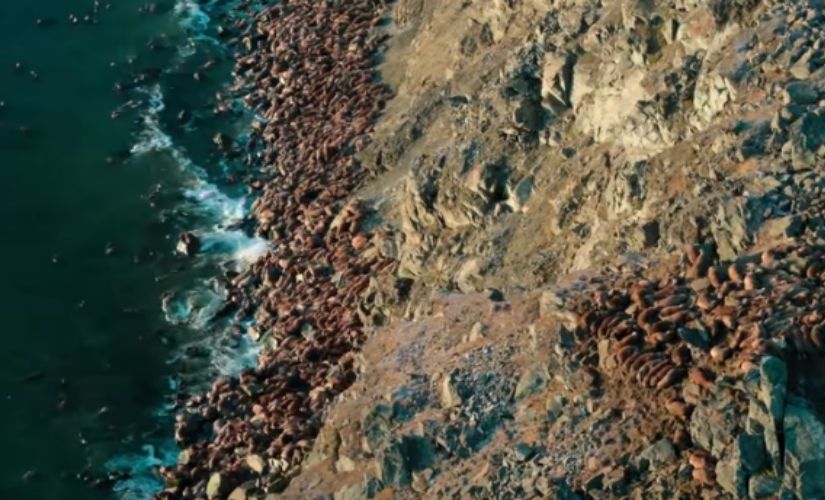By Jean-Baptiste Gouyon The BBC’s new wildlife television series featuring David Attenborough, Seven Worlds, One Planet, marks a drastic departure from previous programmes. For the first time, the presenter can be heard repeatedly uttering the phrase “climate change” in a BBC documentary otherwise devoted to exploring and explaining animals’ behaviour and how they adapt to their environment. The series marks a turn in the history of wildlife television broadcasting. In the UK, it is being celebrated as the long-awaited engagement of one of the most trusted public figures with the most pressing issue of our time. But why has it taken so long, and how will it shape the genre going forward? Critics might want to claim that the move is simply a case of “greenwashing” – the BBC jumping on the bandwagon of the climate emergency so that its wildlife programming remains relevant.
But the BBC has already produced specific programmes on climate change, also featuring David Attenborough, over the past two decades. It just hasn’t integrated climate change into wildlife television until now. As I show in my new book, BBC Wildlife Documentaries in the Age of Attenborough, wildlife television’s main environmental focus has traditionally been the conservation of biodiversity. When Desmond Hawkins created the BBC Natural History Unit (NHU) in 1957, one of his objectives was to instill a sense of the value of protecting nature in audiences. One line of argument in favour of this project was philosophical and aesthetic. This framed nature as indispensable to humans as a source of solace and regeneration in the aftermath of the Second World War. Another argument was moral and framed wildlife as heirloom. Humans had a duty of care towards other forms of life on the planet, so that future generations could enjoy them.
As part of this approach, viewers were encouraged to develop an emotional attachment to wildlife, making them more inclined to support conservation.
In one of the most celebrated wildlife television sequences of all times, from Life on Earth (BBC, 1979), Attenborough appears to cuddle with mountain gorillas in Rwanda. Emphasising how much common ground exists between humans and big apes, it is credited with having been instrumental in kick-starting fundraising for the protection of mountain gorillas.
But when it came to the environment, British wildlife television took an allusive approach rather than a head-on one. That’s because producers thought that programmes with an unambiguous focus on environmental issues could only be structured around “doom and gloom” stories – scaring away the large audiences that wanted to experience the wonders of wildlife. A daring way forward This kind of tactic could only go so far, though. Forty years on, and the makers of Our Planet (Netflix, 2019) finally did away with it. They provided viewers with uncompromising depictions of the consequences of climate change on wildlife. The now famous and disturbing sequence of walruses falling off a cliff in north-east Russia in the second episode of the series, has come to epitomise this new “show it like it is” approach.
In response, the BBC likewise chose to be uncompromising in its portrayal of climate change’s impact on animals’ existence. The dramatic sequence of a grey-headed albatross chick blown off its nest during a storm induced by climate change in Seven Worlds, One Planet is similarly hard to forget. Yet, none of these two series can be said to have gone down the “doom and gloom” pathway seen in many previous documentaries about climate change. On the contrary, the overall message is rather positive, one of hope. How come? Throughout the history of wildlife television, filmmakers have been adept at talking to scientists, enabling them to use cutting-edge research to renew the stories they tell. Wildlife, after all, does not change very much.
And research highlights the value of wildlife conservation as one of the solutions to the climate crisis.
For example, a recent study demonstrated that tropical forests with a thriving population of elephants absorb significantly higher volumes of carbon dioxide than tropical forests without such animals. Building on such research showing that environmental issues are connected, it becomes possible to make a positive case for wildlife conservation – beyond the moral or aesthetic arguments that prevailed in the past. [caption id=“attachment_7765411” align=“alignnone” width=“825”]  Photo: screenshot from Our Planet behind the scenes clip.[/caption] That climate change regularly polls in the top three issues of concern in global populations, as extreme weather events follow one another, has obviously helped drive this change. The ability to offer hope in the shape of solutions to global warming therefore presents wildlife filmmakers with new storytelling opportunities that can draw large audiences. For the first time in the history of wildlife filmmaking, the conservation of wildlife can be presented as holding the promise of a happy ending, in ways that are relevant to a large segment of the world population. Our Planet and Seven Worlds, One Planet therefore mark the start of a new era for wildlife television – one which doesn’t shy away from political and environmental problems. And the trend looks set to continue. Each episode of Seven Worlds, One Planet consistently drew around 8 million viewers in the UK, whereas Our Planet boasted 33 million worldwide. In the coming years, wildlife broadcasters are likely to keep using this new story line, foregrounding the climate crisis as evidence that wildlife conservation is more necessary than ever.
Ultimately, wildlife television’s long-awaited engagement with climate change is not greenwashing. Instead, it is the outcome of new research enabling producers to integrate the defining issue of our time in their main narrative framework – and offering hope.
Jean-Baptiste Gouyon, Associate professor in Science Communication, UCL This article is republished from The Conversation under a Creative Commons license. Read the original article.


)
)
)
)
)
)
)
)
)



